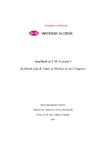Mostrar o rexistro simple do ítem
Apartheid in J. M. Coetzee’s Boyhood, Life & Times of Michael K and Disgrace
| dc.contributor.advisor | Cabarcos Traseira, María Jesús | |
| dc.contributor.author | Barreiro Vilariño, Montserrat | |
| dc.contributor.other | Universidade da Coruña. Facultade de Filoloxía | es_ES |
| dc.date.accessioned | 2015-11-30T08:20:10Z | |
| dc.date.available | 2015-11-30T08:20:10Z | |
| dc.date.issued | 2015 | |
| dc.identifier.uri | http://hdl.handle.net/2183/15655 | |
| dc.description.abstract | The aim of this essay is to analyse J. M. Coetzee’s Boyhood (1997), Life & Times of Michael K (1983), and Disgrace (1999) from a socio-political point of view. This critical approach will prove useful in demonstrating the pervasive presence of apartheid within Coetzee’s texts, as well as his criticism to this socio-political situation from its inception and evolution to its aftermaths in the “new South Africa.” Thus, although Boyhood was written when the TRC hearings were coming to an end, its story is set around 50 years earlier, at the beginning of apartheid. The text reflects the palpable unbalanced social situation in the country as it rewrites the pastoral Afrikaner myth, describes the presence of prevalent violence in everyday life, and questions the racist categorisation of people promoted by the government. Next, in the analysis of Life & Times of Michael K, the thread of Coetzee’s criticism is taken from the beginning of apartheid in Boyhood to its core. This section of the analysis focuses on recurrent themes like violence and categorisation, but it also highlights new ones such as the political power of silence. Finally, the study advances to the transition period after apartheid in Disgrace. By tracing the evolution of a mature protagonist, David, the essay analyses the novel’s depiction of the violent inheritance of a racist social system and, more particularly, the prevalence of sexual offences against women. | es_ES |
| dc.language.iso | eng | es_ES |
| dc.rights | Os titulares dos dereitos de propiedade intelectual autorizan a visualización do contido deste traballo a través de Internet, así como a súa reproducción, gravación en soporte informático ou impresión para o seu uso privado e/ou con fins de estudo e de investigación. En nengún caso se permite o uso lucrativo deste documento. Estos dereitos afectan tanto ó resumo do traballo como o seu contido Los titulares de los derechos de propiedad intelectual autorizan la visualización del contenido de este trabajo a través de Internet, así como su repoducción, grabación en soporte informático o impresión para su uso privado o con fines de investigación. En ningún caso se permite el uso lucrativo de este documento. Estos derechos afectan tanto al resumen del trabajo como a su contenido | es_ES |
| dc.subject | Coetzee, J.M | es_ES |
| dc.subject | Apartheid en la literatura | es_ES |
| dc.subject | Sudáfrica en la literatura | es_ES |
| dc.subject | Boyhood | es_ES |
| dc.subject | Disgrace | es_ES |
| dc.subject | Life & times of Michael K | es_ES |
| dc.title | Apartheid in J. M. Coetzee’s Boyhood, Life & Times of Michael K and Disgrace | es_ES |
| dc.title.alternative | Apartheid en Boyhood, Life and Times of Michael K. y Disgrace de J. M. Coetzee | es_ES |
| dc.type | info:eu-repo/semantics/masterThesis | es_ES |
| dc.rights.access | info:eu-repo/semantics/openAccess | es_ES |
| dc.description.traballos | Traballo fin de mestrado (UDC.FIL). Literatura, cultura e diversidade. Curso 2014/2015 |






